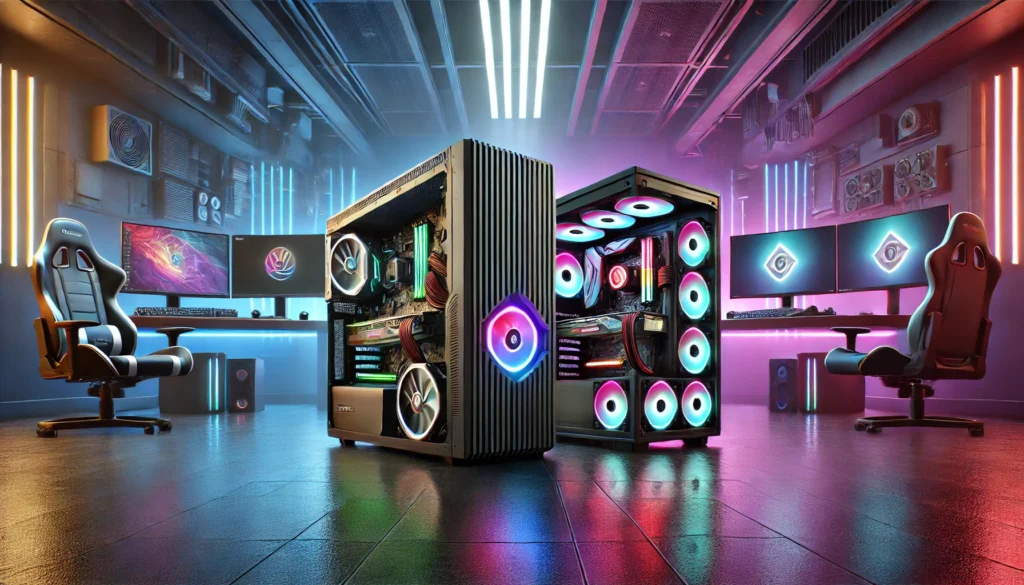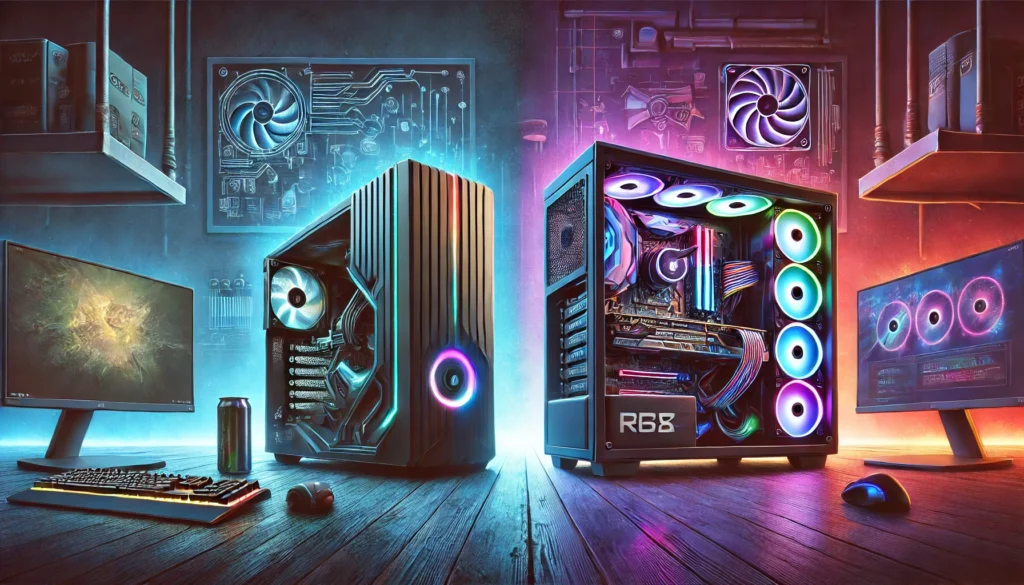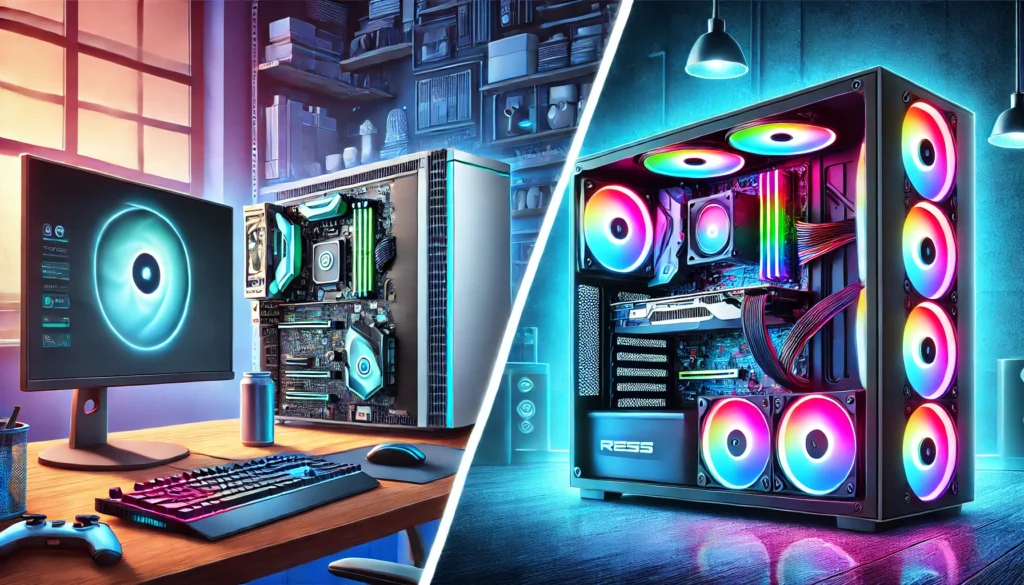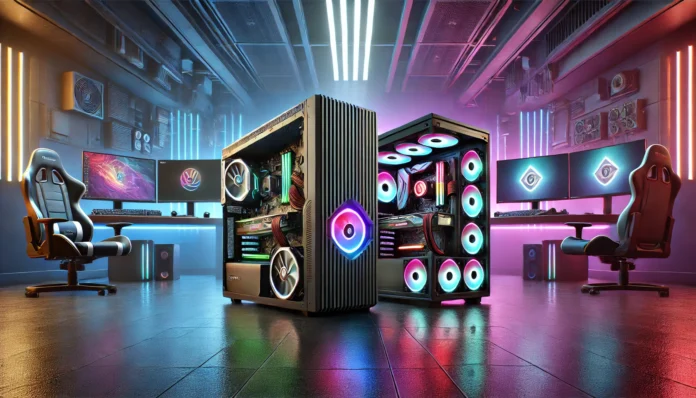The gaming PC market has grown exponentially, offering a vast range of options to suit every type of gamer. Whether you’re a casual player looking for a reliable setup or an enthusiast seeking high-performance hardware, the choices can feel overwhelming. Among the many decisions gamers face, one of the most common dilemmas is choosing between a pre-built gaming PC and a custom gaming PC. Pre Built vs Custom Gaming PCs Which Is Better
A pre-built gaming PC comes fully assembled, tested, and ready to use, making it a convenient choice for those who want to dive into gaming without the hassle of building a computer. On the other hand, a custom gaming PC allows you to handpick each component, tailoring your setup to your specific needs, budget, and preferences. While pre-built PCs offer simplicity and professional assembly, custom PCs provide unmatched flexibility and upgrade potential.
This article explores the pros and cons of both options to help you decide which is better for your gaming needs. Whether you’re debating the cost-to-performance ratio, wondering about upgradeability, or concerned about warranties, we’ll break it all down so you can make an informed decision about your next gaming rig. Let’s settle the debate: Pre-built vs custom gaming PCs – which is better?

Understanding Pre-Built Gaming PCs
What Are Pre-Built PCs?
Pre-built gaming PCs are computers assembled and sold by manufacturers such as Alienware, ASUS ROG, and HP Omen. These machines are ready to use straight out of the box, offering gaming enthusiasts an easy and hassle-free solution. Depending on the budget and performance requirements, pre-built PCs come in various categories:
Entry-Level PCs: Designed for casual gaming, these are budget-friendly options with moderate specs for running popular games at lower settings.
Mid-Range PCs: Perfect for gamers looking for a balance between performance and affordability, offering smooth gameplay for most AAA titles.
High-Performance PCs: Tailored for enthusiasts, these PCs feature top-tier components like the latest GPUs and CPUs, ideal for 4K gaming or VR experiences.
Advantages of Pre-Built PCs
1. Convenience and Time-Saving:
Pre-built PCs eliminate the need for researching and assembling components, making them ideal for those with limited time or technical expertise.
2. Professional Assembly and Testing:
These PCs are professionally built and rigorously tested to ensure stability and performance, reducing the risk of compatibility or assembly errors.
3. Warranty and Customer Support:
Pre-built systems typically come with a comprehensive warranty covering the entire setup, along with reliable customer support.
4. Bundled Software or Peripherals:
Manufacturers often include extras like pre-installed drivers, gaming accessories, or software bundles, adding more value to the package.
Disadvantages of Pre-Built PCs
1. Higher Cost for Similar Specs:
Pre-built PCs often come with a markup for assembly, branding, and customer support, making them more expensive than custom-built alternatives with comparable performance.
2. Limited Customization Options:
Unlike custom PCs, pre-built systems restrict users in choosing specific components, potentially leading to compromises on preferences.
3. Proprietary Components:
Some manufacturers use proprietary hardware, making future upgrades difficult or costly.
4. Pre-Installed Bloatware:
Many pre-built PCs come loaded with unnecessary software, which can slow down performance and require manual removal.
Pre-built gaming PCs are an excellent option for those prioritizing convenience, but their limitations in customization and cost may not appeal to every gamer.
Understanding Custom Gaming PCs
What Are Custom PCs?
Custom gaming PCs are computers built from scratch by selecting and assembling individual components. Instead of purchasing a pre-assembled system, you choose specific parts such as the CPU, GPU, motherboard, and RAM from brands like AMD, NVIDIA, and Corsair. This approach allows you to tailor your gaming PC to meet your unique needs, whether it’s for budget gaming or high-performance tasks like streaming and video editing. The process involves researching compatible components, purchasing them separately, and assembling the PC yourself or with the help of a local technician.
Advantages of Custom PCs
One of the main benefits of building a custom gaming PC is full control over components. You can handpick every part, from the graphics card to the cooling system, ensuring the best performance for your specific gaming needs. This customization often results in a better cost-to-performance ratio, as you’re not paying extra for brand names or unnecessary features.
Custom PCs are also more future-proof, offering easier upgrades down the line. For instance, you can swap out an older GPU for a newer model without worrying about proprietary restrictions. Additionally, building a PC provides an excellent opportunity to learn about hardware, giving you valuable knowledge for maintenance and troubleshooting.
Disadvantages of Custom PCs
Building a custom gaming PC isn’t without its challenges. It can be time-consuming and requires significant research to ensure all components are compatible. There’s also a risk of assembly errors, such as incorrectly connecting parts, which could damage the system. Unlike pre-built PCs, custom setups don’t come with an all-in-one warranty, meaning each part has its own warranty, which can complicate repairs or replacements.
Lastly, troubleshooting can be daunting for those without technical knowledge, especially when diagnosing issues like overheating or boot failures. Despite these challenges, custom PCs remain a popular choice for gamers seeking flexibility and long-term value.
—
Key Factors to Consider
1. Budget
When deciding between a pre-built gaming PC and a custom gaming PC, budget plays a crucial role. Pre-built PCs often cost more due to assembly, labor, and branding. For example, a mid-range pre-built PC may cost $1,500, while building a custom PC with similar specs could cost $1,200. However, hidden costs in custom builds, like tools, shipping, or assembly fees if you hire help, can add up. Consider your overall spending capacity and whether convenience outweighs potential savings.
2. Technical Knowledge
Building a custom gaming PC requires some expertise. You need to understand hardware compatibility and assembly techniques, which can be overwhelming for beginners. Conversely, pre-built PCs are an excellent choice for non-technical users. They come ready to use, eliminating the need to research and troubleshoot during setup.
3. Purpose
Think about how you’ll use your gaming PC. If it’s solely for gaming, both pre-built and custom options can suffice. However, multitasking—like streaming, video editing, or graphic design—requires specific hardware configurations, which custom PCs handle better. Aesthetics matter too; custom builds allow full control over RGB lighting and case design for a personalized setup.
4. Time and Convenience
Building a custom PC can take hours or even days, depending on your expertise. It also requires careful testing to ensure everything works. In contrast, pre-built PCs offer instant plug-and-play functionality, making them ideal for those with limited time.
5. Future-Proofing
Custom gaming PCs shine in upgradeability. You can easily swap out components over time, ensuring longevity. Pre-built PCs, however, often include proprietary parts that limit upgrades.
6. Warranty and Support
Pre-built PCs come with comprehensive, all-in-one warranties covering the entire system. Custom PCs rely on individual warranties for each component, requiring more effort to manage repairs or replacements.

Comparing Real-Life Scenarios
When deciding between a pre-built gaming PC and a custom-built one, it’s helpful to examine real-world scenarios. Here are three examples tailored to different types of gamers:
1. The Budget Gamer
If you’re gaming on a budget, a pre-built gaming PC priced at $800 might seem like a convenient choice. It offers mid-range specs like a decent GPU and enough RAM to handle most modern games at 1080p. However, for those willing to invest time and effort, building a similar custom gaming PC could save around $100, costing you $700. The custom route gives you the freedom to choose high-quality parts and avoid unnecessary bloatware, ensuring you get maximum value for your money.
2. The Enthusiast Gamer
For gamers seeking the best performance and aesthetics, pre-built high-end PCs priced at $2000 often include RGB lighting, liquid cooling, and powerful components like the latest GPUs. These machines are professionally assembled and ready to use, ideal for users who prioritize convenience. On the other hand, custom-building the same high-performance PC could cost around $1800. You can handpick every component, tailoring the build to suit your needs while saving money. Enthusiasts often enjoy the creative control and learning experience that comes with assembling a custom-built gaming PC.
3. The Busy Professional
For those short on time, pre-built PCs offer unparalleled convenience. You can purchase a gaming PC that’s pre-assembled, tested, and covered by an all-in-one warranty. Meanwhile, busy professionals who prefer custom PCs can outsource the assembly to a local PC shop. While this incurs an additional cost, it combines the advantages of custom components with professional expertise.
Each scenario highlights the trade-offs between cost, convenience, and control, helping you decide whether a pre-built or custom PC suits your needs best.
Common Myths and Misconceptions
When deciding between pre-built and custom gaming PCs, several myths and misconceptions can cloud judgment. Let’s debunk the most common ones to help you make an informed choice.
1. Pre-built PCs are always overpriced.
Many believe that pre-built gaming PCs are overpriced compared to custom builds. While it’s true that pre-built systems include costs for labor, branding, and sometimes unnecessary software, they aren’t always a poor value. High-volume manufacturers often negotiate bulk discounts on components, which can sometimes make pre-built PCs more competitively priced, especially during sales like Black Friday or Cyber Monday.
2. Custom PCs are only for experts.
The idea that custom PCs are only for tech-savvy individuals is a common misconception. While building your own gaming PC requires basic knowledge, plenty of resources, such as tutorials and tools like PCPartPicker, make the process accessible to beginners. Additionally, local PC shops can assemble your parts for a fee if you’re hesitant to do it yourself.
3. Pre-built PCs are more reliable.
Pre-built gaming PCs are often marketed as more reliable due to professional assembly and testing. However, this doesn’t mean custom PCs are inherently less dependable. Reliability largely depends on the quality of components used, not whether the PC is pre-assembled or custom-built. With careful part selection and proper assembly, a custom PC can be just as reliable as a pre-built one.
4. Custom PCs always offer better performance.
While custom PCs typically allow better optimization for specific needs, this doesn’t guarantee superior performance. Pre-built PCs are often configured by experts to provide balanced performance out of the box. The difference boils down to how much effort and customization you’re willing to invest in your build.
Debunking these myths clarifies that both pre-built and custom PCs have their strengths, and the best choice depends on your unique needs.
Practical Tips for Decision-Making
When deciding between a pre-built gaming PC and a custom-built gaming PC, taking a practical approach can help you make the best choice for your needs. Here are some tips tailored for both pre-built buyers and custom builders.
1. For Pre-Built Buyers
If convenience and time are your priorities, a pre-built gaming PC might be your best option. However, it’s essential to choose wisely:
Research Trusted Brands and Models: Look into reputable manufacturers like Alienware, ASUS ROG, or HP Omen. Ensure the model you’re considering meets your gaming needs without unnecessary extras.
Look for Deals During Sales: Seasonal sales like Black Friday and Cyber Monday are excellent opportunities to snag a pre-built PC at a lower price. Some brands also offer student discounts or special bundles.
Check Reviews and Customer Support Options: Read customer reviews to gauge the performance and reliability of the PC. Confirm the warranty coverage and ensure the brand has responsive customer support in case of issues.
2. For Custom Builders
If you prefer a hands-on approach and want complete control over your gaming PC, building a custom gaming PC is the way to go. Here’s how to get started:
Use Online Tools for Compatibility: Websites like PCPartPicker help you select compatible components, avoiding costly mistakes during assembly.
Watch Tutorials and Guides: There are countless step-by-step guides available online to assist beginners in assembling their first custom PC.
Test Components After Assembly: Before installing software, thoroughly test all hardware to ensure everything works correctly.
Budget Extra for Unforeseen Issues: Building a custom PC often involves unexpected costs, like additional tools, replacement parts, or troubleshooting expenses.
Whether you choose a pre-built or custom-built gaming PC, careful planning will ensure you get the best performance and value for your investment.

Conclusion:
Choosing between a pre-built gaming PC and a custom-built one ultimately depends on your personal needs, priorities, and gaming aspirations. Pre-built PCs offer unmatched convenience, professional assembly, and all-in-one warranties, making them an excellent choice for those short on time or technical expertise. On the other hand, custom gaming PCs provide full control over components, better cost-to-performance ratios, and long-term upgradeability, which appeals to tech-savvy gamers.
If you value ease of use and prefer a plug-and-play experience, a pre-built gaming PC might be the best option. However, if you enjoy the process of selecting parts, learning about hardware, and optimizing performance, building your own gaming PC can be incredibly rewarding.
Before making a decision, evaluate your budget, available time, and level of technical confidence. Consider the type of games you play, whether you’ll need additional features like VR or streaming capabilities, and how future-proof you want your PC to be. Both options have their strengths and weaknesses, but by aligning your choice with your gaming goals, you’re sure to find the perfect solution.
No matter which route you choose, your gaming PC is an investment in countless hours of enjoyment and performance. Take your time to research and make a decision you’ll be proud of.
FAQs for Pre Built vs Custom Gaming PCs Which Is Better
1. Is it cheaper to build a custom gaming PC or buy a pre-built one?
Building a custom gaming PC is often cheaper for similar performance, as you avoid paying for labor and branding costs. However, pre-built PCs save time and offer bundled warranties, which can justify their higher price for some users.
2. Are pre-built gaming PCs good for high-performance gaming?
Yes, many pre-built gaming PCs are designed for high-performance gaming and come with powerful hardware. However, they might have limited upgrade options due to proprietary components, unlike custom PCs.
3. How difficult is it to build a custom gaming PC?
Building a custom gaming PC requires some technical knowledge, but with online guides and tools like PCPartPicker, even beginners can assemble one. It involves selecting compatible components and carefully assembling them.
4. Which option is better for long-term use: pre-built or custom PCs?
Custom PCs are generally better for long-term use due to their upgradeability. Pre-built PCs may use proprietary parts, which can limit future upgrades.
5. Can I customize a pre-built gaming PC?
Some pre-built gaming PCs allow limited customization, such as upgrading RAM or storage. However, they don’t offer the same flexibility as building a custom PC from scratch.

